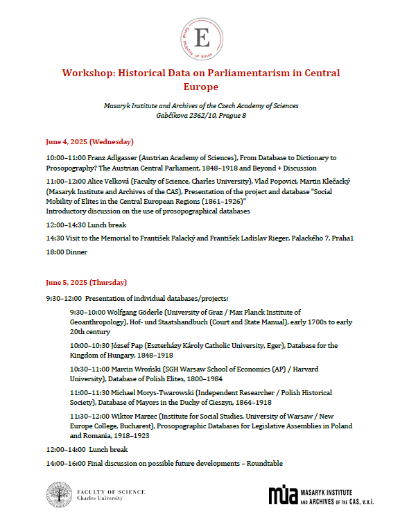
Project GX20-19463X Social mobility of elites in the Central European regions (1861–1926) and transition of imperial experience and structures in nation-states
Time duration: 1 January 2020 – 31 December 2024
Provider: Czech Science Foundation
Program: Grant projects of excellence in basic research group (EXPRO)
Research organizations: Charles University, Faculty of Science (main investigator doc. PhDr. Alice Velková, Ph.D.)
Masaryk Institute and Archives of the ASCR, v. v. i. (investigator Dr. Vlad Vasile Popovici)
The interdisciplinary project analyses and compares transformation processes in modern European societies on the example of two non-central regions of the Habsburg Monarchy: Bohemia and Transylvania. It shows how social mobility, education, family and other ties of elite social groups contribute to de/stabilizing of the society as a whole. The research is conducted on two groups of members of the decision-making strata: higher-ranking state officials and deputies of the land diets, the Imperial Council in Vienna and the Hungarian Parliament. In an imaginative way, the project combines methods from both humanities and nature sciences. Its main goal is to investigate factors which had a significant impact on whether an individual would become member of the above-mentioned elite groups, to clarify the process of circulation of elites and the transition of imperial experience and structures into the newly created succession states. It shows links between career of an individual and his family ties and sheds light on demographic factors influencing the modern European family.
In our research we closely cooperate with the project "The development of modern parliamentary culture in the Bohemian Lands and in the Czechoslovakia" realized under the NAKI II programme (DG18P02OVV025) and carried out by the National Museum, the Masaryk Institute and Archives of the CAS and the Institute for the Study of Totalitarian Regimes.
One of the aims of the project is to create a database of all MPs elected in the Bohemian lands between 1848 and 1992. The members of the EXPRO project also participate in completing the database, which will be launched at the end of 2022 through a web application presenting the history of Czech parliamentarism. One of the outputs of the project so far has been the National Museum's exhibition on the Parliament.
Research questions
The chief goal of the project is to answer the main research question. To do this, we will approach the matter at hand from three different perspectives whose aim is to shed light on partial research questions. The main research question “How did the factors which influenced social mobility and co-determined membership of the elites evolved from the mid-19th century to the late 1920s?” is followed in three basic perspectives:
- Vertical / Diachronic perspective
- Societal factors
- In what ways did the society’s attitude to the decision-making elites change over time? What are the mechanisms for selecting these elites?
- How did the factors determining whether an individual became member of the elites change over time?
- What was the role of nationality? In other words, were the chances of entering the ranks of the decision-making elites the same for those individuals whose nationality (language) was different from the state-ruling class? If not, in what ways were these chances different, and by what means could they be increased?
- To what extent was there a continuity with the previous regime as concerns the political and administrative structures in the newly-created succession nation states?
- Factors directly influencing individual members of the decision-making elites
- Demographic factors – number of children in the family, birth intervals, age at marriage, number of marriages concluded, age at given stages of career
- Importance of social background, socioeconomic status and kinship
- Importance of education and belonging to a specific ethnic, confessional or political group
- Marriage strategies and strategies to secure one’s offspring
- Gender aspects and their manifestations in the individual groups
- Societal factors
- Horizontal / Cross-sectional perspective – importance of different types of relationship for career advancement
- Importance of kinship networks
- Importance of contacts with local elites (social, cultural, economic level)
- Importance of belonging to an “ideological” group (political, national, religious)
- Comparative perspective – on the basis of the above-mentioned questions and factors, the following differences will be observed
- Internally – within the same country
- Differences between deputies active only in the Provincial Diets as opposed to those active only in the Imperial Council/the Hungarian Parliament, between high-ranking and low-ranking officials
- Differences between individuals who, starting their activity under monarchy, continued under the regimes after 1918 and those whose career did not continue, or alternatively, those whose career started only after 1918
- Externally – between the two areas
- What are the differences between the two territories under study?
- How do the results fit in the overall picture of the Empire?
- Internally – within the same country

